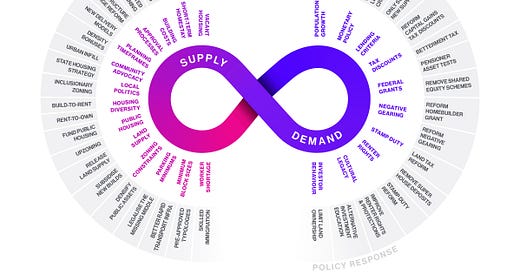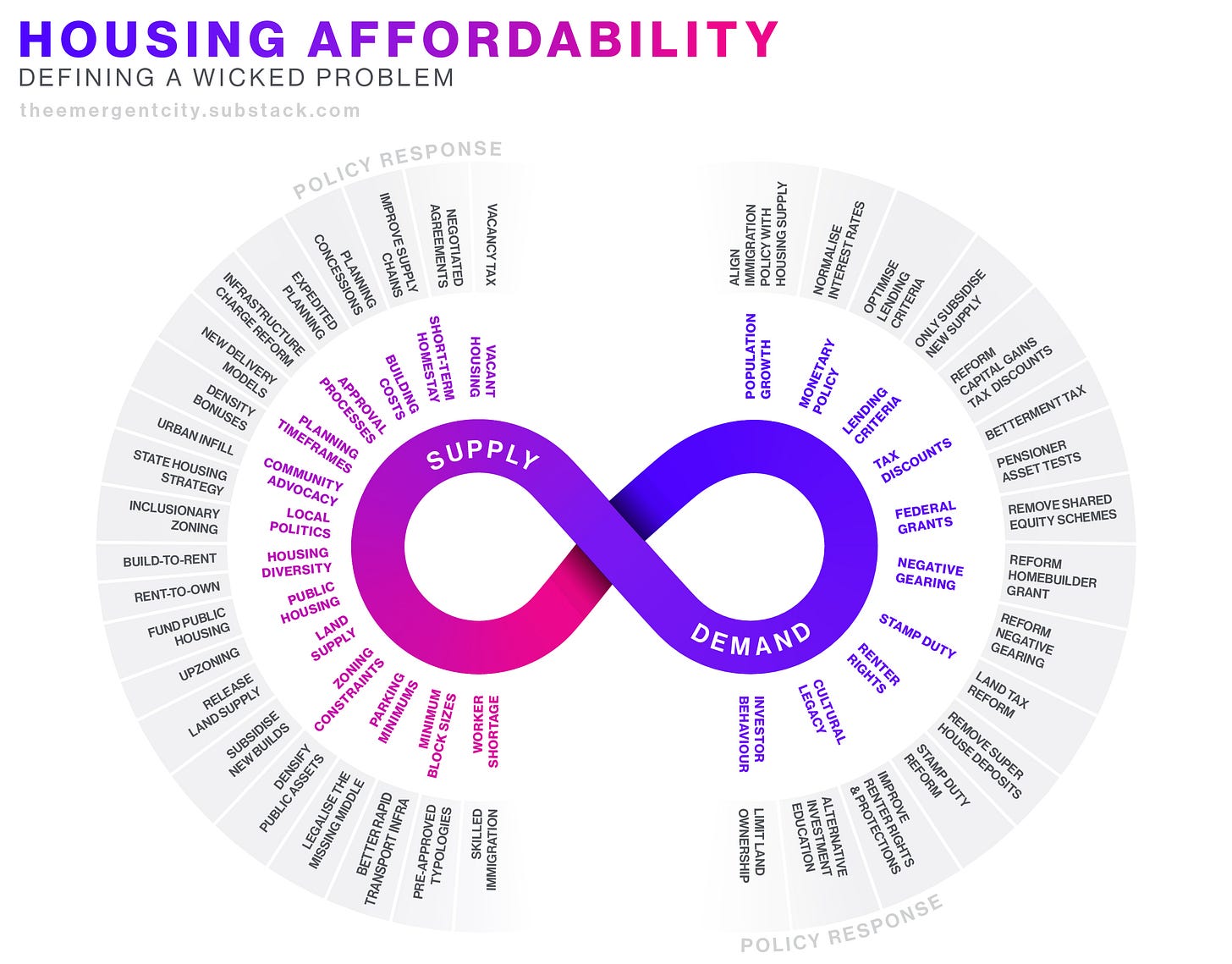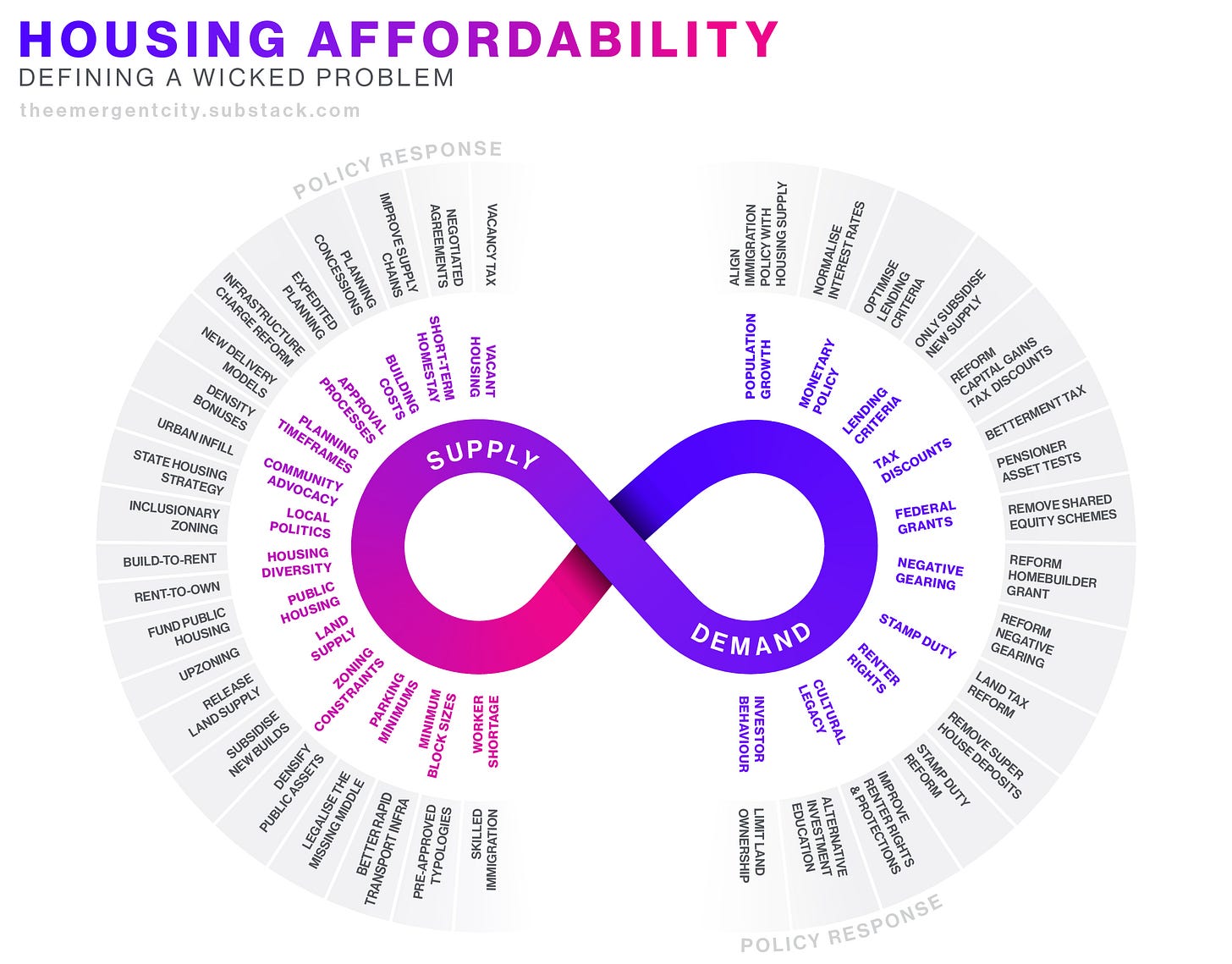The Housing Crisis is a Wicked Problem
How can we move the conversation forward, when everyone is right (and wrong)?
Something I've noticed about the housing crisis debate is that there's very little public understanding that the issue is a Wicked Problem. That is: a problem that's difficult or impossible to solve, because of its complex and interconnected nature.
In terms of solutions, this means that the problem is itself not One Thing and therefore the solution is not going to be One Thing.
Unfortunately, the human brain is completely unequipped to handle this information.
A fun little analogy: The Worst Choir In The World
Imagine you are watching the performance of a truly terrible choir.
Each of the singers is devoid of talent in their own special way. Individually, they would all be considered to be awful singers - but together, they transcend their own lack of ability or basic appreciation of public decency to create a sonic experience that is more horrific than the sum of its parts.
Upon hearing this choir, your body involuntarily experiences an impossible combination of sensory agitation, cold sweats, incredulous confusion, gut-wrenching cringe, numbing disassociation and of course - a blinding, murderous rage.
The result is a religious experience - except you meet Satan.
With their powers combined they are: The Worst Choir In The World.
You are an audience member, in a state of shock and bewilderment typically only found in the victims of war crimes. Why is this happening to you? How did you get here?
You have broken the single most fundamental rule of civilisation: Never, ever indulge amateur entertainment.
You slowly regain your faculties. You want, no - you need to stop this car crash as soon as possible.
Factions begin to emerge amongst the audience members:
One faction believes the baritone section to be the true source of disharmony;
Another faction accuses a group of small boys in the treble section of deliberately entering puberty at this exact moment;
Others accuse the elderly members of the choir of selfishly singing too long past their prime;
Some blame more fundamental issues of the song selection, the venue’s acoustics, the PA system, the event organisers and our very society itself for permitting such a travesty.
The audience factions cannot agree on who to blame for the absolute state of this God forsaken choir.
With each minute spent squabbling, the choir sings on, now recklessly careening into a biblicised, Country-Western reimagining of Huey Lewis and the News’ Hip to Be Square. Hope is all but lost.
What the audience has not yet realised is that every last person in this choir absolutely stinks beyond belief. The whole thing is irredeemable and cannot, must not be saved. It is after all, The Worst Choir In The World.
Of course, some singers are worse than others (life is messy like that), but from the audience, it is impossible to discern who is the main cause of this misery.
Suddenly - chaos! One audience faction storms the stage to clothesline the baritone section - but it has no effect. Somehow, impossibly, the choir gets worse, as the remaining members choose to sing louder and out of their usual vocal register.
The underlying tragedy is this: each of the factions are right - in that the whole choir is contributing to this utter trainwreck of a Saturday.
Each of the factions mistakenly believe their position to be the only correct one - instead of pursuing a holistic approach - like some kind of gas attack, riot cannon or explosion.
Back to the housing crisis
The housing crisis resembles The Worst Choir in the World, in that it needs to be attacked from every angle, all at once, to fundamentally change the way the Australian economy is structured.
There are no silver bullets to the housing crisis.
I repeat: There are no silver bullets to the housing crisis.
A wide array of policy responses are required to sever each of the many heads on this multi-headed chimera. Cutting off one head just makes it stronger.
It is a Gordian Knot - and requires bold, multilateral and heavy-handed interventions to even make a dent in what is an incredibly nebulous issue.
It is a malignant tumour wrapped around Australia's throat, with its veins and tendrils reaching to touch all of our major organs and delicate areas. Like undergoing chemotherapy, we must kill it utterly and completely - and probably hurt ourselves in the act of doing it.
Please! No more analogies!
Everyone is right, and everyone is wrong.
Because we are humans, everybody brings their own biases and hangups to the discussion - cherry-picking their personal bugbears to reflect a narrative most convenient to their worldview and/or source of wealth:
Developers tend to tell it purely as a supply problem, because hey - that’s good for business;
Planners tend to look at it as a zoning / regulatory issue because they spend their professional lives sifting through planning schemes;
Architects tend to see it as a design issue, because there’s no problem that can’t be solved by great design (that was sarcasm);
Millennials and Zoomers love to complain about negative gearing, because it’s directed at established wealth;
Quantity surveyors see it as a cost of labour and materials issue, because those are skyrocketing with inflation;
Suburban home owners blame things like Airbnb and favour any solution that doesn't affect them, because NIMBYism is the default human setting;
Some economists think abstract monetary policy, a decade of historically low interest rates and loose lending criteria are the sole cause, because they’re not used to thinking in terms of cities;
Many point to the various infestations of rent-seeking parasites attached to the underbelly of the housing industry *cough* real estate agents *cough*;
And of course, a lot of shall we say Citizens of the Internet think the problem is solely driven by high levels of immigration - in part because it’s easy to understand and get worked up about. To be fairer to this position, I for the life of me cannot understand why (in the middle of a housing crisis!) the Feds are enacting the biggest two-year population surge in Australia’s history, driving an increase of 900,000 residents. I fully appreciate that we are basically a third-world economy without immigration, but these are big numbers people!
On top of those identified above, there are many more bland and unsexy factors that get a lot less airtime.
As with diagnosing The Worst Choir In The World - nobody here is wrong. Some are probably more right than others - but we can’t actually know much more than that.
Unfortunately, we have arrived in a place where reasonable people can disagree.
Is it even possible to weigh these factors?
The questions that are currently driving me crazy are these:
How much are each of these drivers contributing to the problem?
How heavily should we weight their importance?
Which policy responses are more important than others?
I don't know! Do you?
Is there even a way to even answer this question? It seems like important work that needs to be done.
Macro-economists, please chime in.
Complexity makes communication difficult
I created the infographic above because I wanted something that captures all of my arguments from my article series on the housing crisis:
Australian Housing Culture Is Incompatible With Rapid Urbanisation
How to solve housing (un)affordability - Part 1 - Legalise "The Missing Middle"
How to solve housing (un)affordability - Part 2 - Build. More. Housing.
How to solve housing (un)affordability - Part 3 - "De-Investify" housing
This graphic summarises everything I have identified as a driver of, and a policy response to the crisis through an increasing supply / reducing demand lens.
The graphic’s limitation is of course (as stated in this article) that all of the drivers and policy responses are weighted equally - and they shouldn’t be.
But the next time someone tries to tell you that the crisis would be over if we could only design the perfect inclusionary zoning policy - please rub this graphic in their smug little face.
Subscribe to my Substack!
As a subscriber, you’ll get my full articles (complete with images) in your email inbox - sparing you having to go to the actual website or be lucky enough to spot my articles in your feed. I find this to be a much more enjoyable and consistent way to read the writers I follow, so if you have enjoyed any of my articles so far, please subscribe.







Great conversation Riley. We certainly need more of this long form discussion. Unfortunately long form discussion does seem to be a dying art. I would suggest that we could spend some time considering the question or even the problem that we are trying to address. As Charles Kettering put it "A problem well defines is a problem half solved". "Housing Crisis" is a headline to sell many and varied stories (some agencies are clearly using it as click bait) but it is not actually a tangible thing to be addressed. I believe that the benefits of this discussion and getting it right are far too valuable to be put off by the difficulty of questioning the existing beliefs or status quo.
We have better tools than the limited (economic only) lens to address this issue. With the amount of financial resources sloshing around in this space, I am convinced we do not need more or additional money.
We need 1. Different thinking and 2. An intent to make a change.
For these two reasons, all levels of Government are excluded from leadership in this space. They will be necessary laggards to participate, but we cannot continue to wait for their involvement. Government is not the place to go for new thinking or intent to change. All levels of politics are desperately trying to convince a jaded public that they are relevant and that we should vote for them. This seems to be at odds with any observation of the systems provided by the Government being decidedly unfit for purpose and continuing to be pushed and prodded with tweaks at the edges.
Medical system - (working or not working?) The medical system noise seems to be we all need more from someone else.
Education system - (working or not working?)
Defence system - (working not working?)
Housing system - (working or not working?) All the suggestions being touted have all been given a run over the past 4 decades and have contributed to where we are today.
Reports generated for the HIA show that the current government collection from the new house and land delivery is a whopping 40%, and this system is their current cash cow!